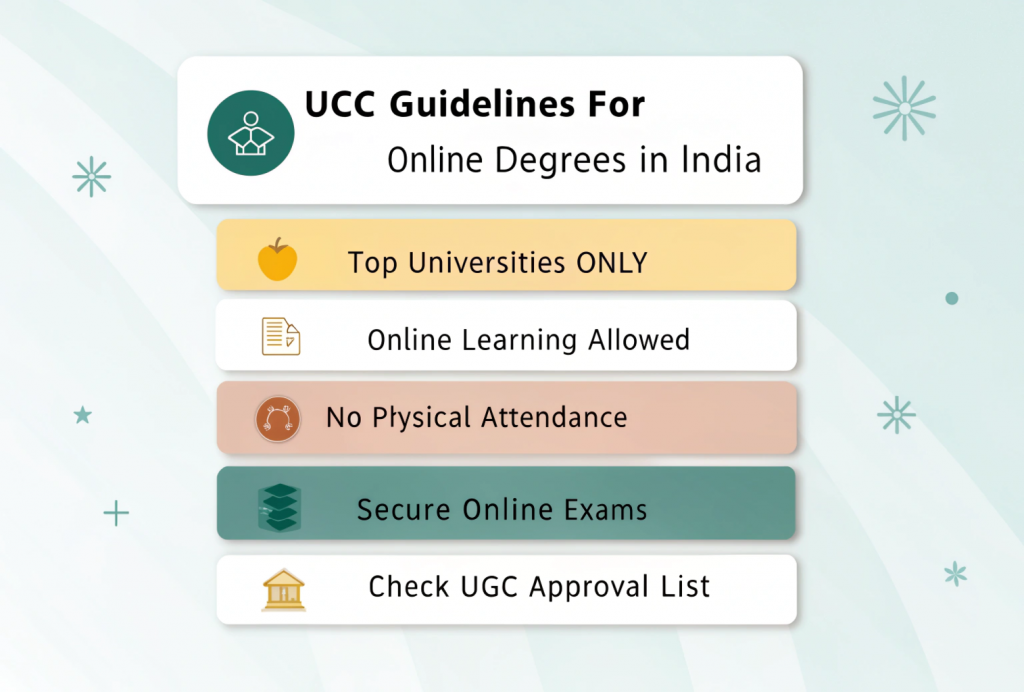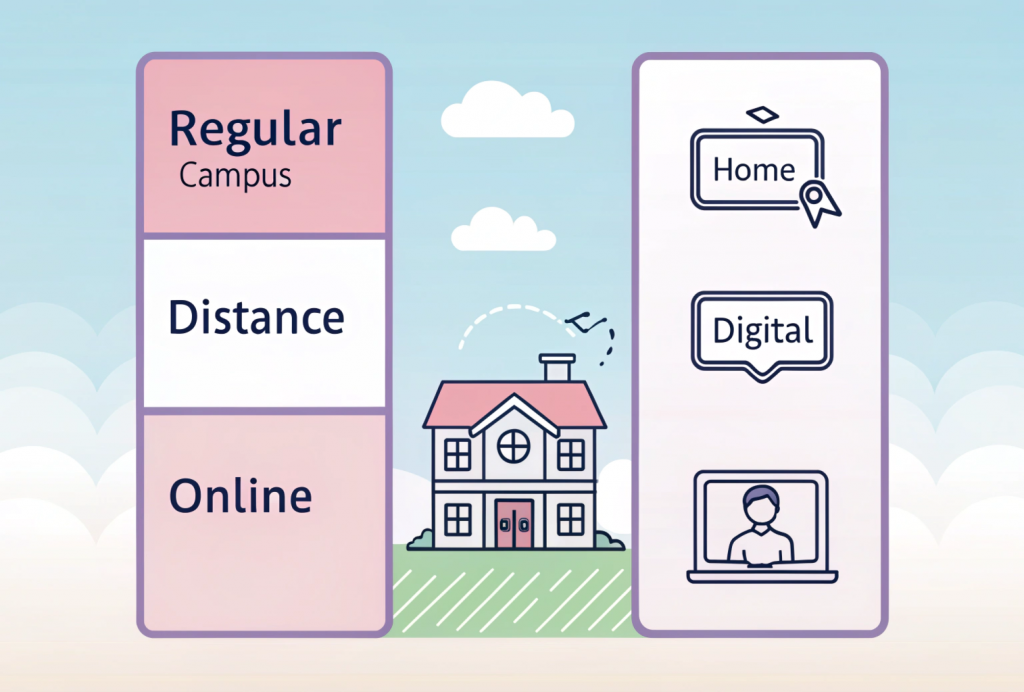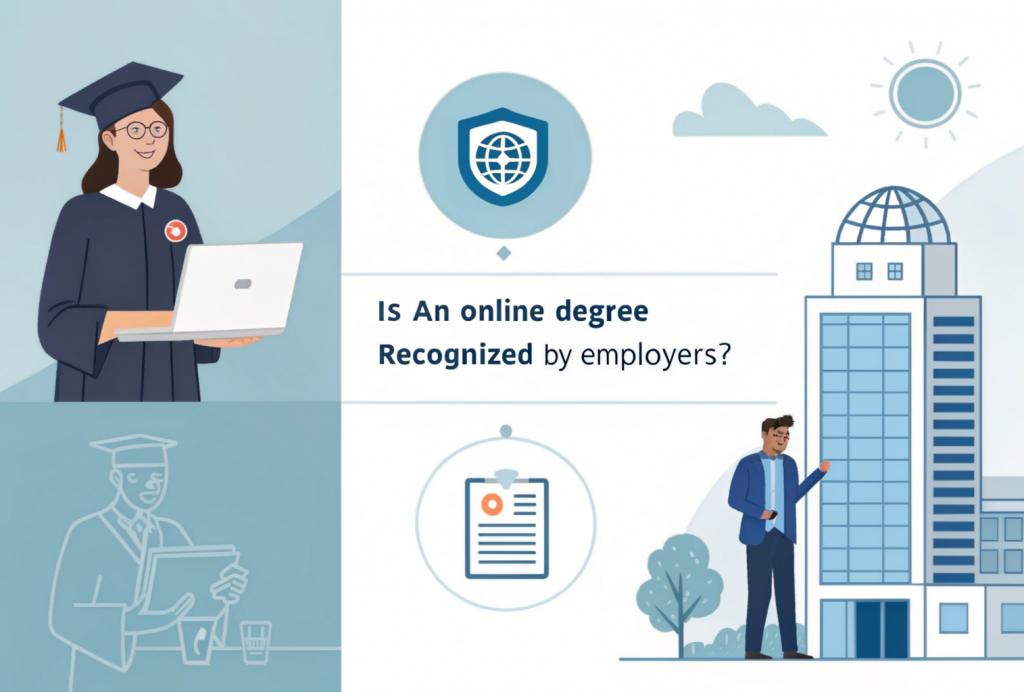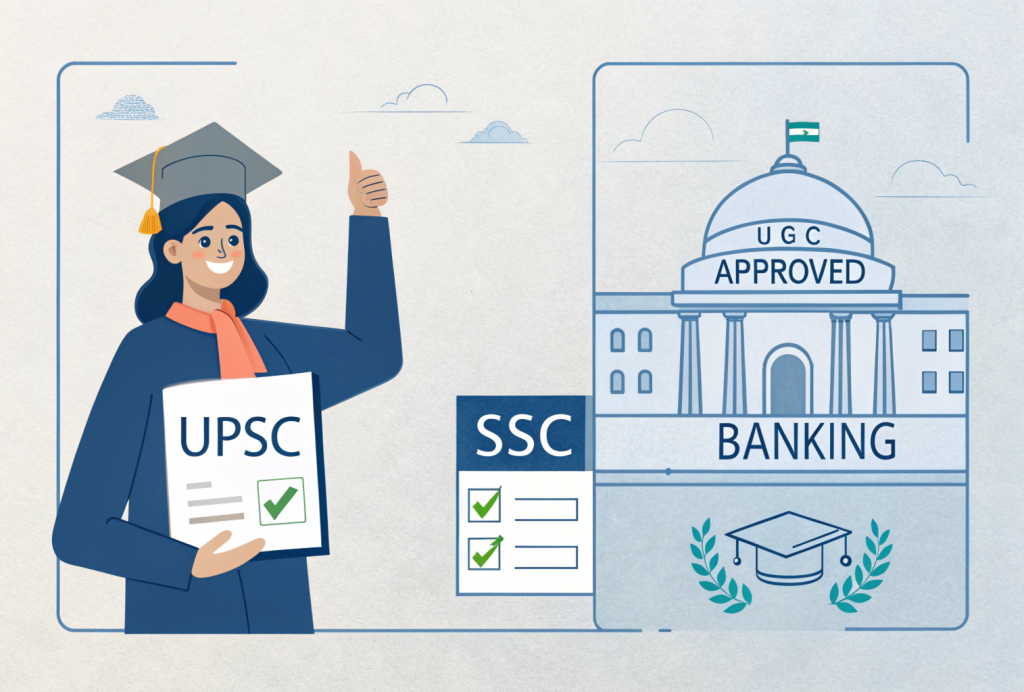Is Online Degree Valid in India?
Let’s be honest—life today is fast-paced, and not everyone can drop everything to attend a full-time college. That’s exactly where online degrees step in.
The demand for online education in India has skyrocketed after COVID-19. When everything went digital—from schools to offices—it made people realize that quality education is possible from the comfort of home.
But it’s not just the pandemic. Even today, many working professionals, homemakers, and students from small towns or rural areas are choosing online degrees. Why? Because:
They’re flexible—you can learn at your own pace, anytime, anywhere.
They’re often more affordable than regular campus programs.
You can balance studies with a job, business, or personal responsibilities.
Whether it’s an MBA, BCA, MCA, or even specialized diplomas, online learning is no longer seen as “lesser”—it’s becoming a smart and strategic choice for career growth.
So, is online degree valid in India? That’s the big question—and the answer depends on where you study, how you study, and how recognized the program is.
This guide breaks it all down for you.
UGC Guidelines for Online Degrees: What You Need to Know

Let’s clear one thing up—yes, online degrees are valid in India, but only if they follow the rules laid down by the University Grants Commission (UGC). UGC is the main authority that ensures online programs maintain quality and legitimacy. Below is a breakdown of the key UGC guidelines that every student should know before enrolling.
| UGC Guideline | Details |
|---|---|
| University Eligibility | Only universities in the Top 100 NIRF Rankings or with NAAC A+ (3.01+) accreditation can offer online degrees. |
| Mode of Learning | Programs can be delivered through recorded lectures, live classes, or a mix of both. |
| Physical Attendance | Not required. Students can study entirely online from any location. |
| Examination Method | Exams must be conducted in a secure manner via online proctoring or authorized centers. |
| Public Verification | UGC publishes an official list of approved universities for online programs. Always verify before applying. |
If your university follows the UGC’s criteria—especially regarding accreditation, delivery mode, and fair assessments—then your online degree is 100% valid and recognized in India. Make sure to check that the degree is approved by UGC which is most important part step before making any decision.
Difference Between Online, Distance & Regular Degrees

If you’re confused between online, distance, and regular degrees—don’t worry, you’re not alone. A lot of students mix these up, but each one is actually quite different in how it works, how it’s delivered, and who it’s best suited for.
Let’s break it down so it’s easy to understand.
| Type of Degree | Learning Mode | Classroom Required? | Best For | Recognition |
|---|---|---|---|---|
| Regular Degree | In-person classes on campus | Yes | Students who can attend full-time classes | Fully recognized by UGC/AICTE |
| Distance Degree | Study from home with printed/recorded materials | No (except for exams) | Working professionals or those in remote areas | Recognized if UGC-DEB approved |
| Online Degree | 100% digital with live or recorded lectures | No | Tech-savvy learners who prefer flexibility | Valid if UGC-approved |
Key Differences Explained:
- Structure & Delivery
Regular degrees are traditional classroom-based courses. Distance learning usually provides self-study materials, while online degrees offer video lectures, live sessions, assignments, and digital interaction. - Flexibility
Online and distance programs are far more flexible than regular ones. With online degrees, you can literally attend lectures from your phone or laptop—even in your pajamas. - Student Interaction
Regular classes offer face-to-face interaction. Online degrees often have virtual doubt-clearing sessions, discussion forums, and sometimes even career support. Distance learning usually lacks this kind of interaction. - Exams & Attendance
Regular and distance degrees may require students to physically appear for exams. Most online degrees offer remote proctored exams—so you don’t need to travel anywhere. - Recognition & Validity
All three types are valid only if approved by UGC (and AICTE for technical courses). So yes, online degrees are just as valid as regular ones, as long as they follow UGC guidelines.
So, Which One Should You Choose?
- Go for a regular degree if you want a full-time campus experience.
- Choose a distance degree if you prefer studying at your own pace with less screen time.
- Pick an online degree if you want flexibility, digital learning, and career-relevant skills—especially if you’re working or multitasking.
Explore our online programs to become future-ready
Transform your career with industry-aligned courses designed by experts.
Is an Online Degree Recognized by Employers?

One of the most common questions students ask is:
“Will companies take my online degree seriously?”
And honestly, it’s a very valid concern.
Here’s the short answer:
Yes, most employers do recognize online degrees— as long as they are from UGC-approved universities.
Let’s break it down a bit more:
What Do Private Companies Think?
- In today’s world, especially after COVID, online learning has become the norm.
- Companies now care more about your skills and experience than where or how you got your degree.
- If your online degree is from a trusted university like IGNOU, Amity, Jain, or Shoolini, you’re good to go.
MNCs vs Startups: Any Difference?
- MNCs often have stricter background checks, so they’ll definitely verify your degree’s accreditation. If it’s UGC-approved, you won’t have a problem.
- Startups are usually more flexible. They’re often more focused on what you can do rather than where you studied.
What About Online MBAs or BCAs?
- An online MBA from a reputed university is widely accepted, especially if you have work experience or certifications to back it up.
- Same goes for online BCA or MCA—if you can demonstrate technical skills (like through projects or internships), recruiters are happy to consider you.
Does It Affect Your Resume?
- Not really. Most resumes today just mention the degree name and university—not whether it was online or offline.
- In fact, showing that you’ve completed a degree online while juggling other responsibilities can actually be seen as a plus point. It shows you’re self-motivated and disciplined.
Government Jobs & Online Degrees: What’s Allowed?

A lot of students wonder—“Can I apply for government jobs if I have an online degree?”
The short answer is: Yes, but only if your degree is from a UGC-approved university.
Let’s break it down in a simple way.
Are Online Degrees Valid for UPSC, SSC & Other Govt Exams?
- Yes, you can apply for UPSC, SSC, banking, and state-level exams with an online degree.
- But here’s the catch: the degree must be from a university recognized by UGC (University Grants Commission).
- For technical or professional courses (like B.Tech or MBA), the university might also need approval from AICTE (All India Council for Technical Education).
So as long as your online degree is from a UGC-approved and valid university, you’re good to go.
What About Document Verification?
- During the document verification stage, government departments check if your university is listed under UGC’s approved institutions.
- If it is, your degree will be accepted just like any regular degree—no discrimination at all.
Examples of Eligible Universities
- IGNOU, Jain University, Shoolini Online, Amity, Chandigarh University, and others offering online courses as per UGC norms are valid.
- You can double-check on the UGC-DEB portal to make sure your chosen university is recognized for online education.
Any Risks?
- The only risk is if you enroll in a non-approved or fake university. In that case, your degree might not be accepted for government jobs.
- That’s why it’s super important to verify the approval status before applying.
Red Flags: How to Identify Fake or Unrecognized Programs
Let’s face it—not all online degree programs are legit. While there are many genuine universities out there, there are also a lot of fake ones (often called diploma mills) that just want to take your money and give you a useless degree.
So, how do you protect yourself? Simple: know the red flags and always do your research.
Common Warning Signs of Fake Online Programs:
- No UGC Approval
If the university isn’t listed on the UGC-DEB (Distance Education Bureau) website, that’s a major red flag. UGC approval is a must for any valid online degree in India. - Fake Accreditation Bodies
Some shady universities create their own “accreditation councils” or mention random foreign-sounding names. If it’s not NAAC, UGC, or AICTE, it probably doesn’t count. - No Clear Details About Faculty, Curriculum, or Exams
Real universities are transparent. If the website is vague or doesn’t explain how classes, assignments, or exams work—be careful. - Too Good to Be True Offers
Be suspicious if the program promises things like:- A degree in just a few months
- No exams at all
- Super low fees without any breakdown
- A degree in just a few months
- No Contact Info or Physical Address
A legit university will always provide proper contact details, official email IDs, and physical office locations.
How to Verify a Program’s Legitimacy:
- Check the UGC-DEB Website
Visit www.ugc.ac.in and look for the list of approved universities and programs. - Look for NAAC Accreditation
If the university has an A or A+ grade from NAAC, it’s a sign of quality and recognition. - Check AICTE Approval (for technical/professional programs)
For courses like MBA, MCA, or B.Tech, AICTE approval might also be required.
Conclusion
In one word — yes.
But only if you choose the right university and know what you’re getting into.
Online degrees in India have come a long way. With clear UGC guidelines and top universities stepping into the digital space, online education is now a credible and flexible option. Whether you’re working, managing a family, or living in a place with limited access to colleges, an online degree can genuinely open new doors for your career.
Here’s what really matters:
- Make sure the university is UGC-approved and recognized
- Choose a course that matches your goals and schedule
- Stay away from programs that sound too good to be true
At the end of the day, the value of your degree comes from what you learn and how you apply it. If you stay consistent, take your learning seriously, and build real-world skills along the way, an online degree can be just as powerful as a traditional one.
So go ahead, make your move—your future doesn’t have to be tied to a physical classroom.


Leave a Reply